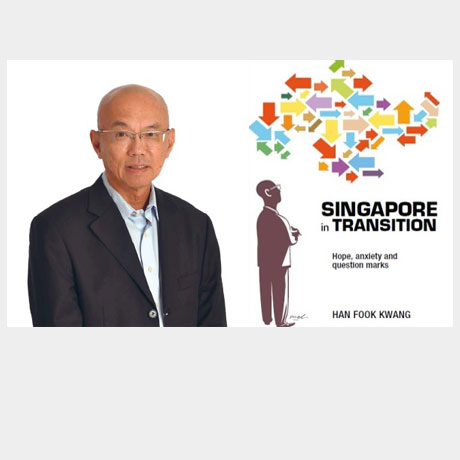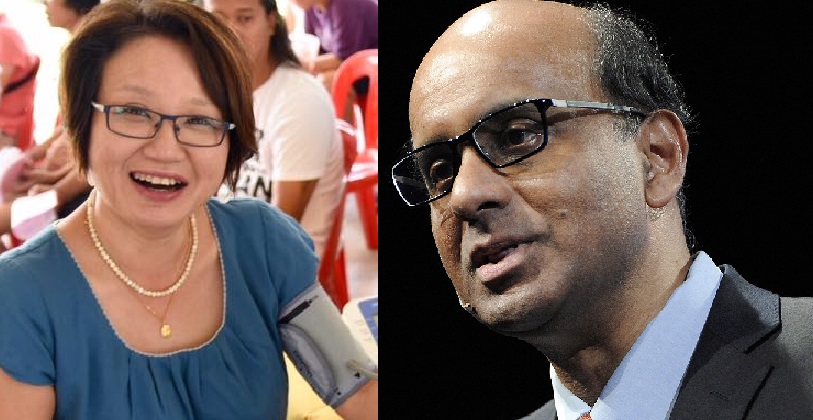On the back of his new book, we found two compliments sitting one after another:
Deputy Prime Minister Tharman Shanmugaratnam:
"Many of the issues you write about come down to our social culture, and especially how we must respect everyone for who they are, and take personal and collective pride in every job done well. I agree with you that it's this culture, the everyday interactions and quality of relationships, starting from when kids are growing up, that's at the heart of the future we want - the mastery of skills, and deep solidarity among Singaporeans."
Workers' Party Chairman and Member of Parliament Sylvia Lim:
"What we need are journalists who have opinions of their own, who show a consistency in values, and who have a depth of understanding of specific subject matter that enables them to critique without needing to hedge or apologise. What I value about ____'s writings is that he appreciates that things are seldom black and white, and that there is validity in the non-official or contrarian narrative. It is no wonder that his opinion have earned a public following."
Who is this Straits Times editor we are referring about?
Drumroll please...
He is none other than Han Fook Kwang, editor-at-large at the Straits Times.
 Source: Kinokuniya website
Source: Kinokuniya website
If you are still a subscriber of The Sunday Times, you probably read the paper for a) Han's commentaries, and b) ST's Food and Drink sections for places to eat.
So the book the above two comments from Lim and Tharman appear on, Singapore In Transition: Hope, Anxiety And Question Marks, is a new 200-page collection of 40 commentaries (from 2012 - 2016) by Han that analyse Singapore's politics, economy, society and Lee Kuan Yew.
If you are not a subscriber or reader of The Sunday Times, you could consider buying his book ($25). After all, you technically have already saved up enough from your 3.5 years' non-purchase of The Sunday Times.
Han started writing his commentaries in August 2012 after he stepped down as Editor.
While some would assume that Han's years of his greatest productivity as a writer were behind him, Han's renaissance as a wordsmith had only just begun.
Commentary after commentary, Han was able to articulate what less eloquent Singaporeans wanted to say, but could not.
He urged fellow Singaporeans and policy-makers to feel more deeply about society, think harder about issues, and do better as a people.
Take his discomfort with the implementation of a satellite-based ERP system without much debate, for instance — Han wondered if it would be better to have a discussion on a fairer and more equitable road pricing system before using technology to implement it.
And check out his poke to some technologically-deterministic bureaucrats:
"... the thing about policy is that, unlike technology, you can't buy it off the shelf. Every city has to develop its own based on its special circumstances and needs".
Or his concern with the maid industry, as he describes the industry as one "that stood still the last 30 years, with no improvement in the quality it delivers or the skill level of its workers".
Anyway, here is a sampling of his 40 commentaries:
1. What dark secret is in the Singapore basement?
"A former colleague messaged me to say it was the best piece I had written. I also heard it touched some raw nerves in the government" - Han
2. Do S'porean workers deserve their wages?
"It generated even more discussion, and a rare compliment from Prime Minister Lee Hsien Loong, who wrote in an e-mail that 'it was very much to the point'" - Han
3. And any of his transport-related commentaries actually. On the transport system (Should transport system go the HK way?), COE (Car ownership scheme should be better managed), or taxis (Taxi woes and the ghost of 1985)
"My first job was at the then Ministry of Communications where I worked on transport policy... I was told that my writing suitably impressed the editors of the paper, who offered me a job years later when I left the service" - Han
Cheong Yip Seng, former editor-in-chief of Singapore Press Holdings' English and Malay Newspapers Division, probably agrees as he praised Han's commentaries in his book, OB Markers: My Straits Times Story
"I rate his pieces on public transport in 1992 among the best we published during my time at The Straits Times. They were well researched and balanced, p.81."
Because Han's commentaries are not mind-blowingly shareable in the way that a millennial reader might expect, it will take a while for one to appreciate their insights.
But read Singapore In Transition: Hope, Anxiety And Question Marks.
It's good.
Top photo: composite from Sylvia Lim's Facebook page and Getty Images.
If you like what you read, follow us on Facebook and Twitter to get the latest updates.
If you like what you read, follow us on Facebook, Instagram, Twitter and Telegram to get the latest updates.
